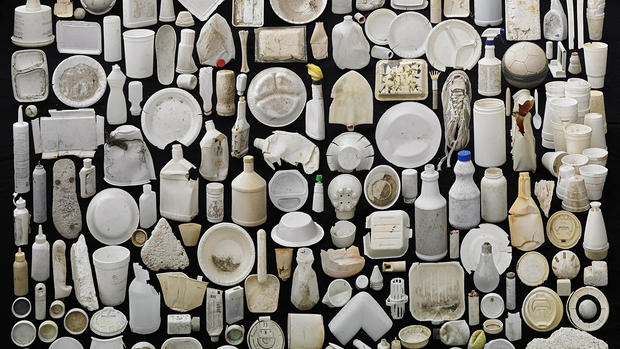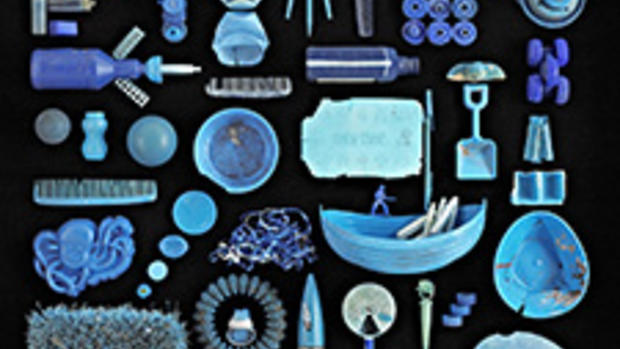Ocean trash becomes photographer's artistic statement
Photographer Barry Rosenthal has found a unique way to tell the story of the damage humans are doing to the Earth's oceans -- by collecting thousands of pieces of trash scooped from the coastal areas of New York harbor and arranging them into intriguing works of fine art for his "Found in Nature" series.
"I feel like I discovered a certain language I can use to express some of the choices we make ... through trash," Rosenthal said.
Though his intent initially wasn't political -- he describes his collecting as an addiction -- it certainly turned into a powerful statement on the environment that makes the viewer ponder the "sheer quantity of trash" we produce and throw away.
Rosenthal's favorite hunting ground is Floyd Bennett Field in Brooklyn, where quite a bit of trash washes up.
"The hard part of what I do is having large collections of very similar trash," explains the photographer. His collections can take years to acquire before he attempts to create a piece.
Once he feels he has enough to work with, it can take Rosenthal one month to create each photo. He must arrange, curate and photograph until the piece is fine-tuned to perfection.
One of his pieces has 140 brown and clear bottles. Showing so many objects in one photo is a statement about the quantity of trash. The more specific each piece is in isolating objects by color, the more the work "heightens how much trash is out there," according to Rosenthal.
His coastal sojourns helped him escape the studio after 25 years of commercial photography. Originally, he went in search of botanical pictures of common plants and weeds. Along the way he found trash, which fed what he describes as an affinity for beaten-up old things.
"The objects had gone through a metamorphosis. Gone were the labels and logos, these objects were aged by the elements. Clearly they didn't belong where I found them," he said.
Rosenthal has amassed thousands of objects, which he stores in beer boxes, bags, and on shelves in his Brooklyn studio. Some things he had to get rid of -- oil bottles were too leaky and messy to keep. Some, like "Blue Ocean," is exhibited alongside his prints as an art installation. Many are curated into different collections.
There's an appealing aesthetic quality to the images which makes them beautiful to look at, while still making one stop and think about the environmental impact of trash. The large size of the prints, 36 by 27 inches, allows viewers to absorb the details of the objects in the work. His work has evolved from grids to whimsical to perspective pieces. The photographer would say that he isn't beautifying trash per se, but "re-using" it.
"If you are an artist in some sort of activist way, any way is right" to get your message across, he said.
Rosenthal has created nearly 30 pieces and continues to work on the series as a Chashama resident artist, which provides him with a studio space in the Brooklyn Army Terminal for his work and collections.
A new report, "The New Plastics Economy," just released at the World Economic Forum in Davos, states that by 2050 our "oceans are expected to contain more plastics than fish (by weight)" -- an astounding statement that makes Rosenthal's images timely and more profoundly disturbing in terms of the fate of our oceans.
Rosenthal's work has recently taken a turn with new collections of objects focusing on people's addictions, such as alcohol, drugs, fast food and smoking. There's always more to collect and reveal for the artist who describes himself as "addicted to collecting."
View photos from "Found in Nature: The Language of Trash" in the gallery above. Barry Rosenthal's work can be seen at these upcoming exhibitions: Open Call: Up for Debate, BRIC House, Brooklyn, N.Y., Feb. 5 - Feb. 28, 2016; and InLiquid Art and Design Benefit, Philadelphia, Feb. 5 - Feb. 6, 2016.
Radhika Chalasani is the senior photo editor at CBSNews.com -On Twitter

